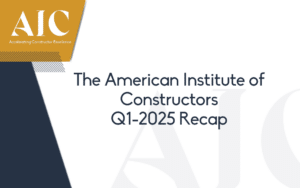Pursuing a degree in construction management is one of the most rewarding career choices that you can make. You have the opportunity to create a stable future for yourself, find your passion in the industry, and build valuable connections with owners who rely on knowledgeable and ethical constructors.
At the American Institute of Constructors (AIC), we view ethics as a critical subject that construction management graduates should be proficient in before they step into the workforce. This way, you are prepared to make a positive contribution to the industry while also capable of protecting your company and your reputation through ethical dealings.
In addition to gaining knowledge about your chosen field, it is crucial for anyone seeking to fulfill their construction management degree requirements to understand construction ethics. A great starting point to increase your appreciation of ethics is the AIC Code of Ethics.
Consider These Statements in the AIC Code of Ethics
You likely encountered ethical issues or scenarios to work through during your construction management courses. Your professors may have asked you or groups of students to evaluate ethical situations to determine the best course of action.
Now you can take what you learned through these exercises and understand how they translate to the construction industry.
For example, the AIC Code of Ethics includes several core statements about how professional constructors should carry themselves in the industry.
- Have full regard for the public interest when fulfilling responsibilities to your employer or client.
- Do not engage in a deceptive practice that creates an unfair advantage for yourself or another party.
- Do not maliciously or recklessly injure – or attempt to injure – the professional reputation of another party.
- Ensure that you provide fair and unbiased advice.
- Do not divulge confidential information to another party that was acquired during the course of your professional activities.
- Carry out your responsibilities in accordance with current professional practice.
- Stay informed of new developments in the construction process.
- Support research and the educational advancement of the construction profession.
These core statements impact every aspect of the industry. We believe that the entire construction industry revolves around a system of professional ethics that dictate how a constructor should interact with clients, subcontractors, subordinates, suppliers, and everyone involved in a construction project.
Gaining a deep understanding of these statements will help you start a career in the construction industry with confidence that you will act, behave, and think ethically at all times.
To see how ethics will play out in real-world situations, let’s review three specific examples you may encounter as a construction manager.
1. How Ethics Impact Materials Ordering
Understanding how to price materials is an essential aspect of construction management. The second point of the AIC code of ethics speaks to this:
- A constructor shall not engage in any deceptive practice, or in any practice which creates an unfair advantage for the constructor or another.
The construction industry is similar to other industries in that the laws of supply and demand directly impact the pricing of construction materials. However, the law of supply and demand is not a license to participate in price gouging.
For instance, when a natural disaster impacts an area, it is not uncommon for unscrupulous individuals to swoop in and offer repair services at a higher-than-normal rate. In the weeks following Hurricane Katrina in 2006, price gouging became a significant issue. While the price of materials and equipment will fluctuate after a natural disaster, it is important that construction managers don’t overinflate their own prices.
In addition to pricing goods and services, an ethical construction manager is expected to keep the price of materials and equipment confidential. If you are a construction manager, you are not expected to share the price that you pay for materials with competing construction managers. Doing so undermines the pricing system set forth by your suppliers.
2. Safety Ethics in Construction
As a construction manager, you are ultimately responsible for the safety of all parties at the job site. Safety includes clients who want to receive updates on the project, the men and women working for you, vendors who deliver goods to the site, and anyone else who has a reason to be on the job site.
The importance of adhering to safety ethics in construction is discussed in the sixth point of the AIC Code of Ethics:
- A Constructor shall carry out responsibilities in accordance with current professional practice, so far as it lies within his or her power.
Providing safe working conditions is paramount for anyone seeking a career in construction management. Ensuring that employees have access to all necessary safety equipment – regardless of the cost of said equipment – is vital.
While deadlines are an essential part of any construction project, construction managers must not encourage employees to take shortcuts to get a job done faster, especially if those shortcuts put the subordinate at risk for physical injury.
3. Fulfilling Obligations
Construction documents dictate everything that goes on at a job site. As a construction manager, you must understand how these documents are at the heart of every job.
In a typical scenario, there will be a contract between the company you represent and the client. This contract will outline the responsibilities of both parties. Ethically, you are responsible for fulfilling everything the contract says you will do.
Additionally, construction managers are also responsible for fulfilling and managing contracts between your company and the people who supply the materials. Knowing how to review construction documents so you can better manage written communications is a crucial part of ethical construction management.
Ready to Fulfill Construction Management Degree Requirements?
Throughout your career in the construction industry, you will take ethics with you. It’s part of your everyday responsibilities and should always be at the forefront of your decision-making process.
Before satisfying your construction management degree requirements, we recommend focusing on ethics, asking questions to understand ethical situations better, and learning from industry professionals who have worked through complex problems.
If you are preparing to begin a career in construction management, we recommend signing up for the AIC newsletter. We will provide valuable information about construction ethics and other critical topics affecting construction managers. You can utilize this resource to grow your knowledge base and prepare for success in the industry.
To sign up for our newsletter, simply drop your name and email address in the sign-up box below. We look forward to supporting you throughout your career path.




